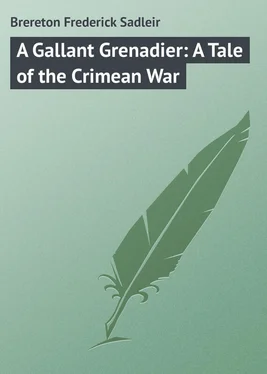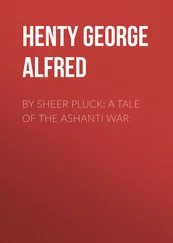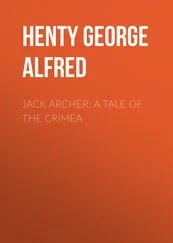Frederick Brereton - A Gallant Grenadier - A Tale of the Crimean War
Здесь есть возможность читать онлайн «Frederick Brereton - A Gallant Grenadier - A Tale of the Crimean War» — ознакомительный отрывок электронной книги совершенно бесплатно, а после прочтения отрывка купить полную версию. В некоторых случаях можно слушать аудио, скачать через торрент в формате fb2 и присутствует краткое содержание. Жанр: foreign_prose, foreign_children, на английском языке. Описание произведения, (предисловие) а так же отзывы посетителей доступны на портале библиотеки ЛибКат.
- Название:A Gallant Grenadier: A Tale of the Crimean War
- Автор:
- Жанр:
- Год:неизвестен
- ISBN:нет данных
- Рейтинг книги:5 / 5. Голосов: 1
-
Избранное:Добавить в избранное
- Отзывы:
-
Ваша оценка:
- 100
- 1
- 2
- 3
- 4
- 5
A Gallant Grenadier: A Tale of the Crimean War: краткое содержание, описание и аннотация
Предлагаем к чтению аннотацию, описание, краткое содержание или предисловие (зависит от того, что написал сам автор книги «A Gallant Grenadier: A Tale of the Crimean War»). Если вы не нашли необходимую информацию о книге — напишите в комментариях, мы постараемся отыскать её.
A Gallant Grenadier: A Tale of the Crimean War — читать онлайн ознакомительный отрывок
Ниже представлен текст книги, разбитый по страницам. Система сохранения места последней прочитанной страницы, позволяет с удобством читать онлайн бесплатно книгу «A Gallant Grenadier: A Tale of the Crimean War», без необходимости каждый раз заново искать на чём Вы остановились. Поставьте закладку, и сможете в любой момент перейти на страницу, на которой закончили чтение.
Интервал:
Закладка:
“Then I tell you the lad will not submit to your proposal,” Joe said hotly. “He is too free and easy to love one of your offices, and is not the one to sit down tamely and have his spirit broken by long hours of monotonous drudgery, paid for at a rate which would disgust the average workman. But I will say nothing to dissuade him, though, mark my words, he will disappoint you again; and then, if he is thrown on the world, I will look after him. It is not for me, Edward, to remind you of your responsibilities to Phil. You took him from the gutter, as I have often heard you say, and it is your duty to bear with him, however troublesome he may be. When he reaches man’s age he will be well able to look to himself, but till then he is a boy, just as thoughtless and high-spirited as I was, and his pranks should not be treated as the deeds of a criminal.
“He got into mischief at Riddington High School, and you were asked to remove him, not only that the discipline of the school might not suffer, but also for the sake of the lad himself. By separating him from some high-spirited companions there was a better chance that they and he might settle down and become more sober, and the headmaster fully realised it. But why on that account you should send him to a school specially set aside for incorrigible lads passed my comprehension, and, as you will remember, did not meet with my approval. As a matter of fact Mr Ebden is a clever man, and took to leading and encouraging Phil instead of driving him. And now, merely because the foolish young fellow is dragged into another piece of mischief – innocent, clean-minded mischief, mind you – you would punish him severely, and possibly ruin his future by placing him in a position in which all his energies will be cramped, and from which he can scarcely hope to rise. I call it a short-sighted policy, and most unfair treatment of the boy.”
Joe once more dipped into his snuff-box, blew his nose loudly, and then, seeing that his brother-in-law did not intend to reply, sniffed loudly and stumped out of the room. A month later, when the end of the term arrived, Phil did not return to Riddington for the holidays, but instead took his box to a dingy lodging in the heart of the city, and straightway set to work at his new duties.
Mr Western had written a cold and reproving letter to him, warning him that this was the last he could do for him; while Joe had sent him a few characteristic lines telling him to do his best, and never to forget that he had one good friend in the world.
Determined to get on well if possible, Phil was most assiduous in his duties at the office, and took pains to master the writing put before him. His employer he saw little of, but whenever they met he was greeted politely, so that he had no cause to find fault in that direction. But lack of friends and lack of outdoor exercise soon told upon him. He lost his healthy looks and became pale and listless, for in those days cycling was not in vogue, and it was seldom that a city clerk was able to shake the soot and dirt of the streets from him and get into the country.
“This won’t do,” thought Phil one evening as, chained to his desk on account of unusual business, he drove his pen till the figures were blurred and his fingers cramped. “If this is the life before me I had rather be a soldier or a sailor and earn my shilling a day, and a little adventure. Fellows have often told me that a steady young soldier is bound to rise, and if he works hard and has a little education, may even reach to commissioned rank. That takes years, of course, but supposing it took ten I should be better off than after spending the same time in this office. Larking has been here fifteen years, and look what he is!”
Phil raised his eyes from his work and stared thoughtfully at a bent and prematurely-aged man who sat on his right. “Yes, I’d sooner see the world and run the risk of losing my life in some far-off country than live to grow up like that,” he mused pityingly. “At any rate I’ll go and have a chat with Sergeant-major Williams.”
The latter was a veteran of the Foot Guards, who had long ago earned a pension, and now lived with his wife on the same landing as Phil.
“Tired of your job, lad, are you?” he remarked, when Phil entered his room that night, saying that he had come for a chat and some advice. “Well, now, I’m not greatly surprised; though, mind you, there’s many a poor starving chap as would only be too glad to step into your shoes. What chance has a youngster in the army, you ask? Every chance, sir; every chance. Look at me” – and the old soldier stood upright on the hearth-rug and threw out his chest, thereby showing the row of medals pinned to his waistcoat. “I was your age, my lad, when I first ’listed, and when I had got my uniform and stood on parade for the first time, trying to look as though I knew all about it, with my chest somewhere close to my back and my stomach showing well in front, why, the sergeant-major came along, and I thought to myself he must be the colonel, and miles and miles above me. I never guessed I’d reach his rank some day; but I did, sure enough, and steady, honest work, and being sober, was what lifted me there. But you’ve got education, and that’s the pull. I had to teach myself, and a precious grind it was; but with you it’s different, and if you only keep out of scrapes you’re certain to go up.”
“But I’m always in trouble and scrapes of one sort or another; at least I was at school!” exclaimed Phil.
“Yes, I dare say you was, and a precious baby you would be if you hadn’t been; but that sort of thing don’t go down in the army. Discipline’s discipline, and so long as you remember that, and the fact that you’re filling a man’s place and are no longer a school-boy, you’re all right. Play your larks in the barrack-room as much as you like, and no one will mind; but never give cheek back to a non-commissioned officer as orders you to stop. It’s mighty trying at times, I know. Some young chap as has just been made a corporal gets beyond himself, and pitches into you. Grin and bear it is what you’ve got to do, and that’s discipline, and it’s minding that will help you to get on.”
“Then you think I shall do well to enlist?” asked Phil.
“Do well? Of course you will. Why, I’d sooner pick rags than be at the work you’re at,” answered the sergeant-major. “How much do you earn a week, my lad, if it isn’t a rude question?”
“Ten shillings, and extra if I’m kept overtime,” said Phil.
“Then you’ll be no worse off in the army,” exclaimed the old soldier. “A shilling a day, less washing, and your extra messing, is what you’ll have, and it won’t be long before you’re receiving corporal’s pay. Now think it over, lad. I’ve no wish to persuade you; but if you decide to ’list for the army, I’ll put you in the way of joining the finest regiment in the world.”
Phil thanked the sergeant-major, and retired to bed, only to lie awake thinking the matter over. By the following morning he had quite made up his mind to be a soldier, and went in to see his friend.
“Look here, sir,” the latter exclaimed, flourishing a morning paper, “you’ve made up your mind to leave that musty office and join the army, but you’re barely seventeen yet, you say. Now, I’ve something to propose, and something to show you. Before you ’list try what it’s like to rough it amongst rough men and earn your own living. Here’s an advertisement asking for hands in a kind of private zoo. I know the show, and a friend of mine, an old soldier like myself, is office-man, and keeps the books. Take a job there for a few months and see how you like the life, and then, if roughing it suits you, join the army. Even then you’ll be too young; but you’re big and strong, and a few months won’t make a great deal of difference.”
Читать дальшеИнтервал:
Закладка:
Похожие книги на «A Gallant Grenadier: A Tale of the Crimean War»
Представляем Вашему вниманию похожие книги на «A Gallant Grenadier: A Tale of the Crimean War» списком для выбора. Мы отобрали схожую по названию и смыслу литературу в надежде предоставить читателям больше вариантов отыскать новые, интересные, ещё непрочитанные произведения.
Обсуждение, отзывы о книге «A Gallant Grenadier: A Tale of the Crimean War» и просто собственные мнения читателей. Оставьте ваши комментарии, напишите, что Вы думаете о произведении, его смысле или главных героях. Укажите что конкретно понравилось, а что нет, и почему Вы так считаете.












